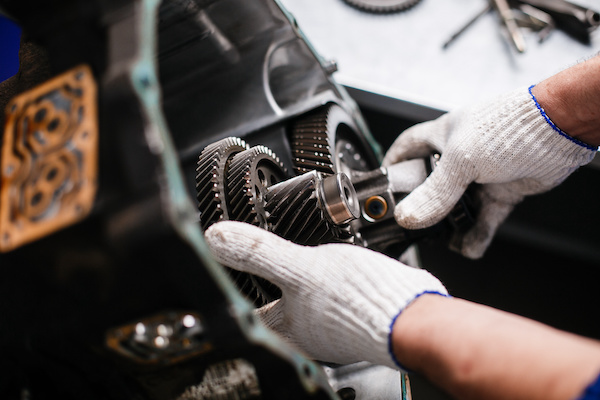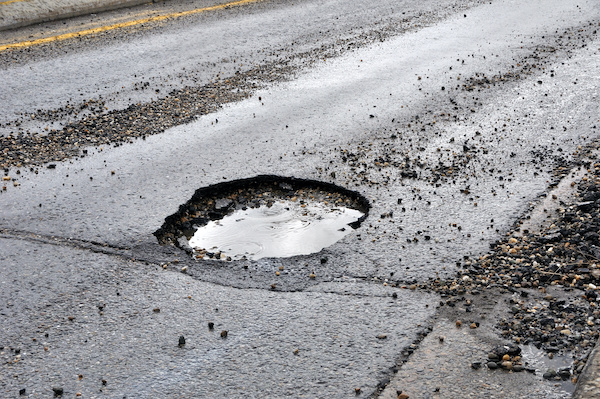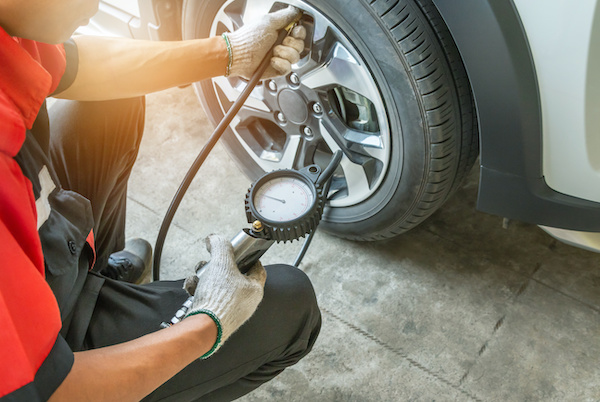Posted on 11/29/2021

The transmission is an indispensable system within all our vehicles because of its important job; it is responsible for transferring power from the engine to the wheels. Without it, your vehicle could not possibly go anywhere! When you shift your car into drive, you are putting the transmission to work. Since it is paramount in terms of the operation of your vehicle, it's no secret that it requires maintenance to work smoothly. Without proper care, your transmission will fail; and the symptoms of a failing transmission are very pronounced. Understanding these symptoms will help you identify them and help you address the problems sooner than later. Here are some of the symptoms of a failing transmission: Buzzing sounds coming from under the hood Transmission gears slipping Burnt odor when your vehicle is running Check engine light lit up on your dashboard Rough or difficult gear shifting Car revs when you press on the gas pedal but accelerate or move your ... read more
Posted on 10/21/2021

It's officially Autumn. A new season means new driving challenges to face. The weather is shifting, the leaves are falling, and the days are getting shorter. As a result, it's crucial to prepare for autumn conditions by performing basic maintenance tasks. Please take your vehicle to BG Automotive, where our expert team can give you a full-point inspection and help you identify any hidden issues before they become dangerous ones. Here are five key points to keep your vehicle in tip-top shape during the Colorado Fall. Tip #1: Check your brake system. It's no news that your brakes are a key factor to your safety; without functional brake components, your vehicle will not be able to stop or slow down at all. This is why your brakes should be a number one priority when it comes to seasonal check-ups. If the brake pads have less than 4 mm left on them, it's time to make a trip to the shop. Tip #2: Confirm that all your lights work. As the days grow shorter, it means ... read more
Posted on 9/27/2021
%20-%20Copy%201.jpeg)
Your vehicle's MPG, or miles per gallon, is a key measure of your vehicle's fuel efficiency and how much distance a car can go before it needs to be gassed up again. If you don't maximize this number, then you may feel some pain in your wallet. Let's be real, gas prices are not getting any cheaper! We've put together a list of 5 things you can do to increase your vehicle's fuel efficiency. Here's what they are: Tip #1 - Limit the usage of air conditioning and/or heating. The HVAC system plays a significant factor in influencing your miles per gallon number. If you like to blast your A/C in hot weather or heat in the cold winters, then you shouldn't be surprised to see a decrease in your fuel economy. To save money on fuel, try to limit the use of AC or heat whenever possible. Tip #2 - Minimize what you store in your vehicle. Items that weigh a ton are not fitted for long-time storage. If you want to be more cautious on how much gas money you ... read more
Posted on 8/23/2021

Windshield wipers are so often overlooked, but they are such a crucial part of our cars. Wipers ensure our safety by helping us see through our windshield whenever it rains, snows, or fogs up when we drive. However, wipers can be very irritating if they aren't doing their job well. To ensure everyone's safety, we suggest you stay on top of when they need to be replaced. Some signs of failing wipers include skipping, streaking, and squeaking noises. According to many manufacturers, you should swap out your windshield wipers once every six months to one year. However, they can require attention before that time frame if not taken care of properly. To help extend the use of your windshield wipers, follow these maintenance tips: Clean your windshield. Cleaning your windscreen will limit the amount of dirt and debris that sticks to your wiper blades. Wipe your wipers. As you regularly use them, your wipers blades collect dust and dirt. You can remove the debris to keep the r ... read more
Posted on 7/21/2021

Every time you step into a vehicle, you have to understand that your safety is compromised. The reality is that we cannot control or foresee how other people drive. There are many drivers out there who are aggressive and lack consideration for others on the road. Sadly, so many accidents happen every year because of the handful of people who like to speed and drive recklessly. To ensure your safety, please make an effort to practice defensive driving. Other benefits of defensive driving may include: Prevents Points from Being Added to Your Driving Record Avoid Accident Fees or Speeding Tickets Discount on Insurance Rates Sense of Personal Responsibility Tips on Defensive Driving 1 - Plan Ahead Defensive driving can commence before you even start your car. If you have a mobile device, get in the habit of checking weather conditions and traffic conditions to know what to expect on your commute. 2 - Always Check Blindspots Whether you are changing lanes or merging onto the h ... read more
Posted on 6/23/2021
%20-%20Copy%201.jpeg)
Your car battery is an integral part of the automotive team. Besides powering the electrical system, it maintains a steady electrical current to start your car and keep it moving. In addition to routine oil and filter change, tire rotation, and other general maintenance practices, maintaining your battery in great shape is equally important. A properly functioning battery guarantees you a healthy and reliable vehicle that runs efficiently. So, How Often Does a Battery Need Replacement? Under proper regular maintenance and proper care, your car battery might even last for five years. All the same, most batteries tend to wear out and become inefficient after three years of daily use. With time, the battery will eventually deteriorate, becoming completely unreliable and calling for a replacement. The trick is to pay keen attention to your battery's condition and performance after three years. If you notice any problem, have a reliable mechanic address it before it affects the entire ... read more
Posted on 5/25/2021

Potholes and other bumps on the road are a menace to every car driver, but they are especially dangerous for those who have cars with low suspension. This is because these small potholes can affect the balance and control of your car, which in turn increases the risk of accidents. In this article we will go over some possible parts that can get damaged by potholes: 1. Tires These are the first components of your vehicle that get damaged when you drive over potholes. The air pressure in your tires is reduced, which can lead to other problems such as the car losing control and reducing stability. Additionally, if you are driving on a regular road surface and hit one pothole, your wheels can be forced out of alignment. Driving with wheels that are not properly aligned can be a detriment to your ability to steer and can wear down your tires excessively over time. 2. Wheel Bearings A wheel bearing is a mechanism that controls how much grease goes ... read more
Posted on 4/23/2021
.jpeg)
A vehicle's engine is the heart of the locomotive, and without proper air circulation, the engine cannot function properly. The combustion process in the engine requires air to function, without which the vehicle may 'suffocate'. For air to reach the engine, it has to go through the air filter. The air filter ensures the air directed to the engine is free of dirt, debris, bugs, and other contaminants that can damage the engine. However, over time, the air filter may get clogged, affecting the air quality that goes to the engine, thereby affecting the vehicle's overall performance. When should you replace your air filter? Drivers are advised to change their air filters after every 12 months or 10,000 to 15,000 miles. However, if you drive through dusty roads often, you should have your air filters checked every 6,000 miles. What are the signs of a dirty air filter? The air filter appears dirty This is one of the most common signs of a dirty air filter. A clean air f ... read more
Posted on 3/17/2021
.jpeg)
Shocks and struts help with the normal impact of everyday driving and can be especially useful when navigating potholes, speed bumps, and other impediments that can otherwise affect your vehicle. Keeping them up and getting them replaced when necessary is vital to the overall functioning of your vehicle, so knowing the difference between the two is helpful in getting familiar with their functioning. It's worthy to note that there are cases when shocks and struts work together for good suspension and absorption, but they can work independently as well. Shock absorbers have good jurisdiction over your vehicle's spring and suspension functions and actually serve to control them using thermal or heat energy. The suspension is converted into motion using hydraulic fluid. In this sense, they act as "oil pumps" as they swing into motion. The piston, which is attached at the end of the piston rod, gives resistance to the hydraulic fluid that's being pumped inside the pre ... read more
Posted on 2/18/2021

There are many things that can lead to driving dangerously. When you're driving you to want to do everything in your power to ensure that you're driving as safe as you possibly can. One thing that many don't consider when it comes to safe driving is tire pressure, especially during cold weather. You want to guarantee that your tire pressure is always right for cold weather. Here are some details on how cold weather can affect your tires and what you need to do! When you're experiencing cold weather, it's good to know what will happen to your tires. When the temperature has dropped the pressure in your tires is affected. This is due to the molecules in the air moving slower and coming closer together. Your tires may lose 1-2 pounds per square inch (PSI) for every ten degrees of change in weather when the temperature drops. When you notice this happening, you don't want to ignore it. A slight decrease in your tire pressure may be difficult to notice, but it can ... read more